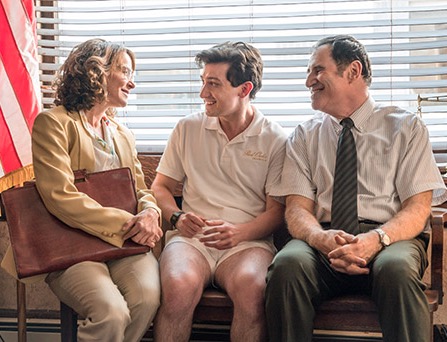Democracy Thrives, At Least in Hollywood

The smarter way to stay on top of broadcasting and cable industry. Sign up below
You are now subscribed
Your newsletter sign-up was successful
Related: Stars Still ‘Living Dangerously’ at Nat Geo
As Amazon unveils its fall premieres, show producers are lifting the veil on the company’s unique public vetting of pilots. Reactions to the user-driven process range from quiet confidence to stark anxiety for those with a show in the game. And while some producers became their biggest cheerleaders in stirring up positive reviews, others simply let the surveys come in on their own.
With the second season of Red Oaks premiering Nov. 11, creators Gregory Jacobs and Joe Gangemi took a passive approach when the retro comedy was up for review a couple of years back. Says Gangemi: “The most I did was, when people would confront me on the street and say they loved it, I’d tell them, remember to go online and vote.”
The exec producers at Good Girls Revolt, a ’60s newsroom drama that debuted Oct. 28, were more active. Lynda Obst describes a full-time social media commitment to sparking positive reviews. “I literally woke up, posted, had a meal and posted,” she says. “It’s the closest I ever felt to Kim Kardashian.”
‘Alpha,’ ‘Betas,’ Etc.
While Amazon’s pilot process dates back to early 2013, when Alpha House and Betas were selected by users, other networks are increasingly relying on public sentiment to shape their series. NBC will invite aspiring musicians to post videos of themselves performing for new competition series The Stream. The 100 most streamed performers attend an industry showcase, and the winner will be the one who ultimately generates the most digital streams.
Paul Telegdy, president, alternative and reality group, NBC Entertainment, sees The Stream as an updated take on traditional singing shows. “We’ll tap into the way that people become stars these days,” he says. “The music business has evolved beyond all recognition due to technology.”
The smarter way to stay on top of broadcasting and cable industry. Sign up below
To be sure, every show that makes it to air has undergone some degree of focus grouping. But as programmers look for every last advantage in this age of peak TV, the vetting appears to be getting more sophisticated. Tom Zito is a cofounder of I’d Watch That, a website that has users vote for their preferred sizzle reels. “My hunch is that you’ll see a lot more of this kind of research happening before a lot of money is spent [on pilots],” he says. “Everybody is looking for some kind of leg up on everybody else these days.”
Amazon has evolved its pilot process over the years. Recent comedy pilots Jean Claude Van Johnson and The Tick were released on Twitch as well as Amazon Video. Roy Price, head of Amazon Studios, says the public platform is “just one tool in our toolkit”—shows sometimes bypass pilots and go straight to series. “We’ve always reserved the right at Amazonto be inconsistent,” he tells B&C.
The Red Oaks creators said the process felt more than just a traditional network’s pilot judgment. “Our pilot was going to be seen not just in a corporate Seattle boardroom, but by the people who we hoped would be our audience,” says Jacobs.
Dana Calvo, exec producer on Good Girls Revolt, refers to it as “the Hunger Games” of pilot processes. “It was so scary,” she says. “I’m so psyched we cleared it.”
Michael Malone is content director at B+C and Multichannel News. He joined B+C in 2005 and has covered network programming, including entertainment, news and sports on broadcast, cable and streaming; and local broadcast television, including writing the "Local News Close-Up" market profiles. He also hosted the podcasts "Busted Pilot" and "Series Business." His journalism has also appeared in The New York Times, The L.A. Times, The Boston Globe and New York magazine.

